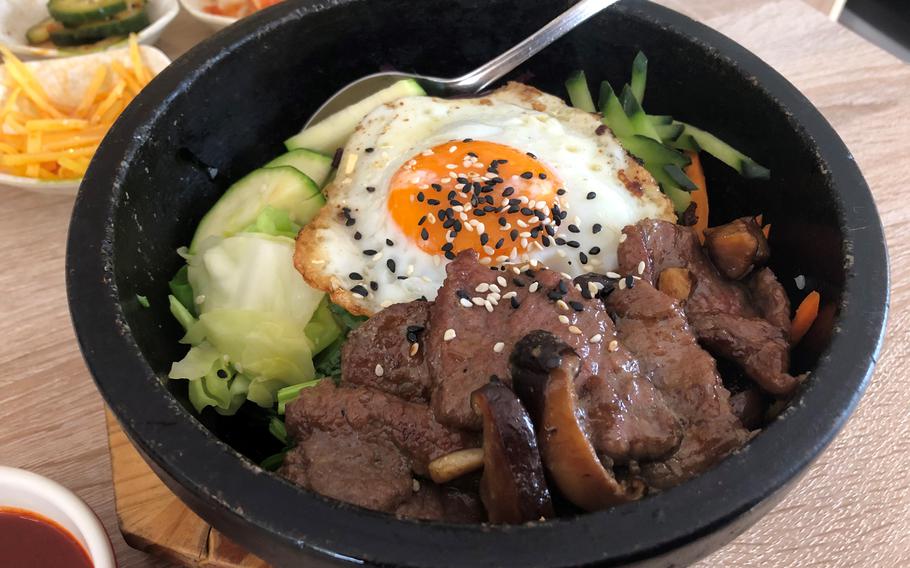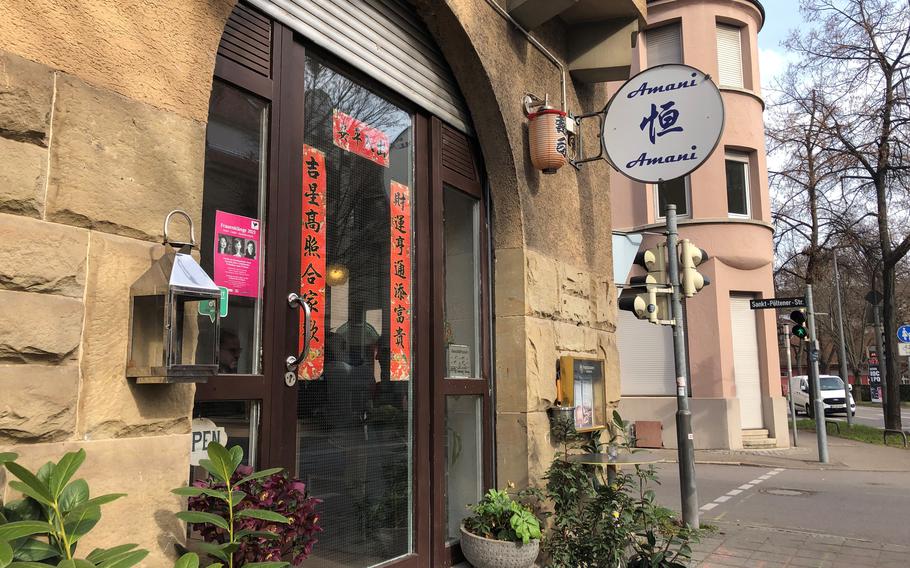
At Amani, a Korean and Chinese restaurant in Stuttgart, Germany, bibimbap is among the many Korean staples on the menu. (John Vandiver/Stars and Stripes)
Korean food was on the menu, but all the writing on the walls of Stuttgart’s Amani restaurant was in Chinese.
However, any reservations I had about faux Korean fare quickly faded when the dish I ordered came crackling in a hot stone “dolsot” bowl.
The classic bibimbap dish consisting of rice, mixed vegetables chopped julienne style, beef and an egg on top was as good as any other I’ve tasted.
And the stone bowl was hot enough that the rice on the bottom got that crucial touch of crispness to it. With spicy gochujang sauce mixed in, the meal hit all the right marks.
A decade ago, there were virtually no Korean options in Stuttgart, but in recent years they have been popping up all over the place. The proliferation seems to coincide with the general trendiness of Korean food, an obscurity in much of the West not so long ago.
Today, formerly exotic ingredients like gochujang sauce can be found on the shelves of ordinary grocery stores and often appear on popular recipe websites as an ingredient to incorporate in everyday cooking.
And kimchi, the humble fermented vegetable dish, is now something of a household name worldwide.

A small kimchi selection is served as a side dish with Korean dishes on the menu at Amani, a restaurant in Stuttgart, Germany. (John Vandiver/Stars and Stripes)
Of course, the potential downside with any culinary trend is the encroachment of imitators who stray from the standards. That was my concern on my first visit to Amani.
Located in the Feuerbach section of Stuttgart, the restaurant advertises itself as a specialist in Chinese and Korean food, cuisines that really have little in common.
But I was pleasantly surprised to see — and taste — that Amani’s take on Korean food wasn’t so far off from what I experienced while living years ago in the Land of the Morning Calm.
The bibimbap I ordered was presented with the usual sampling of side dishes of kimchi, ranging from the best-known cabbage variety to radish and cucumber, that should come with all Korean meals.
And on a previous dinner visit with family, our various orders also got a round of approval. One dining partner ordered the samgyupsal, or grilled pork belly.
The dish, which you grill yourself on a small tabletop cooker, was similar in taste and appearance to what is served in South Korea. There was a missing element, though: the lettuce and perilla leaves used to wrap the meat.
The perilla leaves must be hard to come by in Germany, because Korean restaurants here don’t seem to provide them alongside grilled meats.
Still, Amani serves many of the important Korean staples, such as the various “jjigaes,” or stews, which come in a variety of styles.

The Amani restaurant in Stuttgart, Germany, specializes in both Chinese and Korean food. (John Vandiver/Stars and Stripes)
The restaurant always appears to be bustling, which also is a good sign. In the evening, it’s not a bad idea to make a reservation if you are coming with a larger group. During lunchtime, the restaurant also does a brisk business with the working crowd.
If Korean food isn’t your thing, the Chinese menu provides a fallback option, but I can’t speak to any of that. It had what I was looking for and I very much recommend it.
Amani
Address: Wienerstrasse 58, Stuttgart, Germany
Hours: Tuesday-Friday, 11:30 a.m.-2:30 p.m.; Saturday and Sunday, 12-3 p.m., 5:30-10:30 p.m.
Prices: Mostly 10-20 euros for main dishes.
Information: Phone: 0711-91288755; online: heng-amani.com